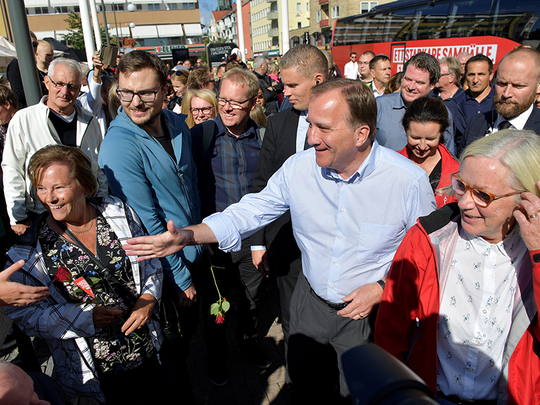
Madrid
In their very first single back in 1972, super band Abba launched the common perception of their Swedish homeland as a place of harmony, with Benny, Bjorn, Agnetha and Anni-Frid singing how “people need hope, people need loving, people need trust.”
Right now, those are commodities in very short supply as Swedes head to the polls in a general election on Sunday, with a sombre political mood permeating a nation that used to be known for its cradle-to-the-grave social programmes and open society.
Not anymore.
Right now, the far-right Sweden Democrats (SD) party is polling close to 20 per cent – not enough to form a government, but with enough support to make it a significant player when the two main coalition blocs come to form the next government in the 349-seat parliament over the next four years.
Since 1994, elections have been held on a fixed four-year term. The SD was only formed in 2010. In the 2012 election, it polled roughly 6 per cent for its agenda of anti-immigration and taking Sweden out of the 28-member European Union based in Brussels. Four years ago, it more than doubled that support to 12.9 per cent, and this time around, polls suggest it could win one vote in five cast by Swedes – though support for the SD has slipped a little in recent days.
Like other Nordic and north European nations, the government is a coalition of smaller parties, with two main political groups running neck-and-neck, though neither the ruling centre-left bloc of Social Democrats or a centre-right opposition block – the Alliance – will win enough seats to form a majority.
For current Prime Minister Stefan Fofven, the prospect of turning to the SD, with anti-refugee, nationalist and law and order policies front and centre, is anathema.
“Like [US President Donald] Trump, [the SD] attack the media and political establishment, question official data on crime and other matters, and recently called Swexit – Sweden’s exit from the EU,” said Pawel Zerka, a political scientist for the European Committee for Social Rights and the European Commission in analysis for Gulf News. “In a dark pre-election broadcast, SD leader Jimmie Akesson presented Sweden as a failing country in which terror rules and to which refugees continued to arrive en masse.”
If there is a crack in the SD’s armour, the Greens have managed to find it. This summer has been the hottest on record, and forests above the Arctic Circle are tinder dry, leading to the worst forest fires in the nation’s history.
Like Trump, Akesson is a climate-change sceptic, and has attacked those who say the environment is changing, saying they were attempting to score cheap political points from the heatwave.
Green Party leader has seen her poll figures bounce in the run-up to Sunday’s polls, attacking the SD for denigrating what she says is “humanity’s biggest challenge”.
Even in the unlikely event that the SD does indeed fall short of their 20 per cent level, they have already succeeded in setting the tone of the campaign.
“Migration, and law and order has never been in the focus of any election in Sweden ever,” notes Gunnar Strummer, who is party secretary for the Moderates and running the centre-right party’s campaign.
But there is an effective “fake news” campaign at work on social media, according to researchers at Oxford University in England who estimate that one-third of all Swedish election news stories shared online contain deliberate misinformation about refugees and Islam.
The Oxford researchers analysed 275,000 tweets over a 10-day period, and found a substantial number – 33 per cent – came from sites publishing misleading, deceptive and misleading information purporting to be real news.
Swedish security officials, however, say there is currently no evidence of a coordinated online attempt to sway Sunday’s vote. Either way, as Abba might put it, Swedish voters are not able to escape their Waterloo – even if they want to.
— inputs from agencies












